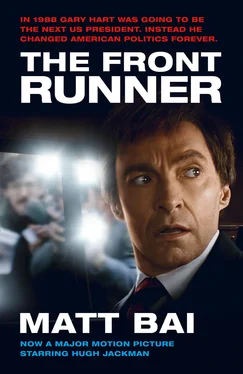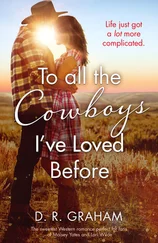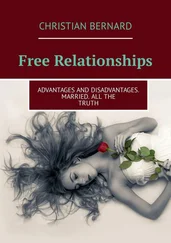At one point, I asked Hart whether he ever felt a sense of relief at having not actually become president. He shook his head emphatically.
“It was a huge disappointment,” Hart said. “A huge disappointment.”
Lee had entered the study and was refilling our water glasses, and she overheard him.
“That’s why he accepts every invitation where someone wants him to speak,” she told me, interrupting him. “Every time he can make any kind of a contribution, he does it, because he thinks he’s salving his conscience. Or salving his place after death or something.” She appeared to try to stop herself from continuing, but couldn’t quite do it. “I don’t know,” she said. “It’s been very difficult.”
“Is that why I give speeches?” Hart said, in an accusatory tone.
“No, no,” Lee answered quickly. “But you do things when you’re tired to the bone that you shouldn’t be doing.”
“Why not?” Hart asked.
“But people keep asking him,” she said, turning again to me. “I mean, they’re all good things.”
“I’m flattered, babe,” Hart said testily. It was not the only time I would see the two of them do this—work through years of unspoken tension under the pretext of answering my questions. I asked Hart what it was he might have to feel guilty about. It seemed we were veering close to the boundary beyond which he had always refused to travel.
“I don’t feel guilty,” Hart snapped. “She’s accusing me of salving my conscience.”
“No, I don’t mean your conscience,” Lee stammered.
“You said it wrong, babe.”
“I said it wrong.”
I asked Lee what she had meant to say.
“What did you mean?” Hart asked, his tone a warning.
“Gary feels guilty,” Lee said finally. “Because he feels like he could have been a very good president.”
“I wouldn’t call it guilt,” Hart said.
“No. Well.”
“It’s not guilt, babe,” he protested. “It’s a sense of obligation.”
“Yeah, okay,” Lee said, sounding relieved. “That’s better. Perfect.”
“You don’t have to be president to care about what you care about,” Hart said.
“It’s what he could have done for this country,” Lee said, “that I think bothers him to this very day.”
“Well, at the very least, George W. Bush wouldn’t have been president,” Hart said ruefully. This sounded a little narcissistic, but it was, in fact, a hard premise to refute. Had Hart bested George H. W. Bush in 1988, as he was well on his way to doing, it’s difficult to imagine that Bush’s aimless eldest son would have somehow ascended from nowhere to become governor of Texas and then president within twelve years’ time.
“And we wouldn’t have invaded Iraq,” Hart went on. “And a lot of people would be alive who are dead.” A brief silence surrounded us. Hart sighed loudly, as if literally deflating.
“You have to live with that, you know?”
2
TILTING TOWARD CULTURE DEATH
THE HART EPISODE is almost universally remembered, on the rare occasion that anyone bothers to remember it at all, as the tale of classic hubris I mentioned earlier. A Kennedy-like figure on a fast track to the presidency defies the media to find anything nonexemplary in his personal life, even as he carries on an affair with a woman half his age and poses for pictures with her, and naturally he gets caught and humiliated. How could he not have known this would happen? Was he actually trying to get caught? During the years after Hart entered my consciousness, I found myself moved to mention my fascination with him to scores of people, and almost invariably I heard some version of the same dismissive response from anyone who was alive at the time, to the point where I could almost finish the sentences for them. How could such a smart guy have been that stupid?
Of course, you could reasonably have asked that same question of the three most important political figures of Hart’s lifetime, all Democratic presidents remembered as towering successes. Franklin Roosevelt, John Kennedy, and Lyndon Johnson had all been adulterers, before and during their presidencies, and we can safely assume they had plenty of company. In his 1978 memoir, Theodore White, the most prolific and influential chronicler of presidential politics in the last half of the twentieth century, made John Kennedy and most of the other candidates he’d known sound like the Rolling Stones gathering up groupies on a North American tour.
“What was later written about Kennedy and women bothered White but little,” he wrote. “He knew that Kennedy loved his wife—but that Kennedy, the politician, exuded that musk odor of power which acts as an aphrodisiac to many women. White was reasonably sure that only three presidential candidates he had ever met had denied themselves the pleasures invited by that aphrodisiac—Harry Truman, George Romney and Jimmy Carter. He was reasonably sure that all the others he had met had, at one time or another, on the campaign trail, accepted casual partners.” (Yes, White wrote his memoir in the reportorial third-person voice, and he used terms like “musk odor.” It was a different time.)
Just after the Hart scandal broke in 1987, The New York Times ’s R. W. “Johnny” Apple, the preeminent political writer of his day, wrote a piece in which he tried to explain how disconnected the moment was from what had come before. Apple described what was probably a fairly typical experience for reporters covering the Kennedy White House:
In early 1963, for example, a fledgling reporter for this newspaper was assigned to patrol the lobby of the Carlyle Hotel while President Kennedy was visiting New York City. The reporter’s job was to observe the comings and goings of politicians, but what he saw was the comings and going of a prominent actress, so that was what he reported to his editor. “No story there,” said the editor, and the matter was dropped.
It was this very understanding between politicians and chroniclers—that just because something was sleazy didn’t make it a story—that emboldened presidents and presidential candidates to keep reporters close when it came to the more weighty business of governing. There was little reason to fear being ambushed on the personal front while trying to make oneself accessible on the political front. In a 2012 letter to The New Yorker, Hal Wingo, who was a Life correspondent in the early 1960s, recalled spending New Year’s Eve 1963 with the newly inaugurated Lyndon Johnson and a group of other reporters. Johnson put his hand on Wingo’s knee and said, “One more thing, boys. You may see me coming in and out of a few women’s bedrooms while I am in the White House, but just remember, that is none of your business.” They remembered, and they complied.
No one should pretend that character wasn’t always a part of politics, of course, and there were times when private lives became genuine political issues. When Nelson Rockefeller, New York’s governor and a Republican presidential hopeful, divorced his wife of thirty-one years in 1962, and then married a former staff member, “Happy,” who was eighteen years his junior and the mother of four small children, the story became inseparable from Rocky’s political prospects. You couldn’t do a credible job of covering the Republican schism in those years without delving at least somewhat into Rockefeller’s private life. When a lit-up Teddy Kennedy drove off a bridge in Chappaquiddick, off Martha’s Vineyard, in 1969, killing twenty-eight-year-old Mary Jo Kopechne, Kennedy’s private recklessness became a relevant and enduring political story; no politician, let alone a newspaper editor, would seriously have argued otherwise. When Thomas Eagleton, shortly after joining George McGovern on the Democratic ticket in 1972, was revealed to have undergone shock treatment for depression, his temperament became a legitimate news story, along with the fact that he had neglected to mention it.
Читать дальше












